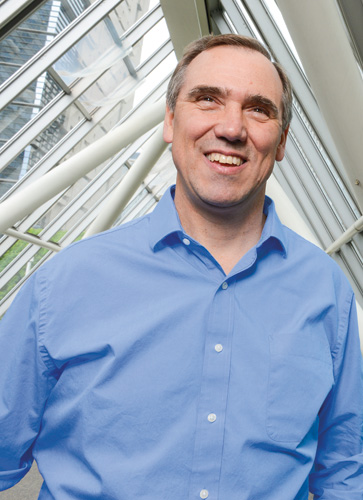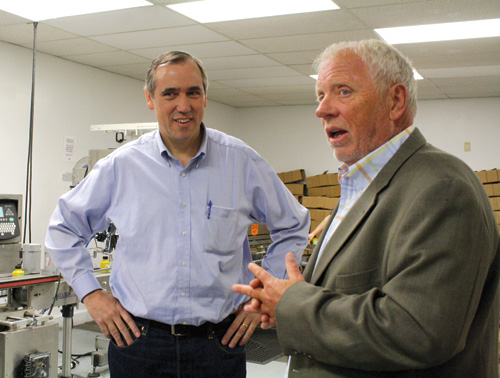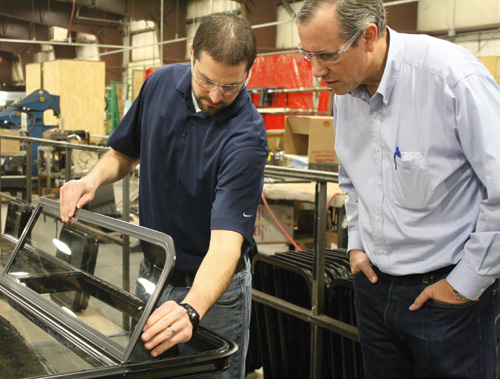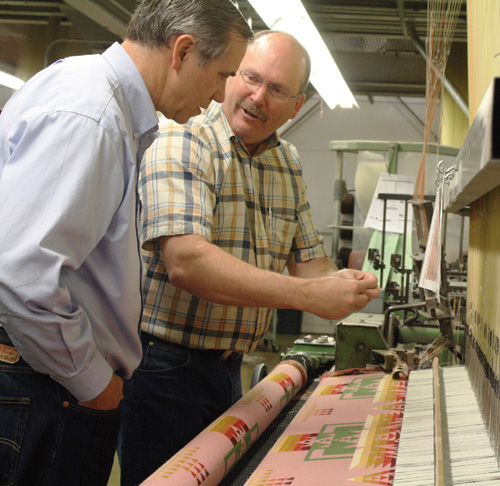Oregon’s junior senator goes on tour to find out what business needs.
 |
Sen. Jeff Merkley at the World Trade Center in Portland. He says the best thing about being a senator is having an avenue to address policy. The worst thing is the gridlock and “witnessing a broken institution.”// Photo by Anthony Pidgeon |
It’s a Tuesday afternoon in April, and Jeff Merkley, Oregon’s junior Democratic senator, is headed west on I-84 near Boardman, explaining the purpose of the poplar trees growing along the highway. Managed by GreenWood Resources, the tree farm is to supply feedstock for ZeaChem, a company that hopes to produce advanced biofuels in its Port of Morrow based refinery.
“You might ask: Why poplar trees,” asks Merkley. He adds, reflectively: “I asked that question myself.” The answer? The GreenWood species boasts a high yield, reaches maturity in only two years and can regenerate after harvest.
A self-described math and science geek, the 55-year-old Merkley is fond of dissecting how things work, whether the subject is the conversion of woody biomass into cellulosic ethanol or the nuances of getting a bill passed in today’s “supermajority” Senate. His cerebral, detail-oriented approach to policy is one reason he’s on the road today. It’s part of a two-week Made in Oregon tour involving 47 manufacturing businesses around the state.
Since 2001, the country has lost 5 million manufacturing jobs and 40,000 manufacturing facilities. Merkley’s goal is to help stop the hemorrhage by figuring out what’s working and not working for Oregon companies engaged in the business of making things.
Riding along with Merkley and his three aides for the Pendleton-Portland leg of the tour provides a glimpse of the hectic and sometimes absurd schedule of a U.S. senator — as well as the diversity of manufacturing in Oregon.
With a few business roundtables and town halls thrown in for good measure, the trip also highlights the evolution of Merkley’s relationship with Oregon business owners, a group that wanted little to do with him during his campaign against two-term Republican Gordon Smith.
Merkley himself told Oregon Business in 2008: “While I was running, what I heard from the business community was that they didn’t think I could win.”
Today, as Merkley fundraises for his 2014 reelection campaign, the liberal son of a Roseburg millworker appears to be changing a few hearts and minds among Oregon business leaders, especially as he makes growth in manufacturing, central to Oregon’s economy, one of his key legislative priorities.
But tackling one of the country’s thorniest issues is no easy task, and the connection between policy at the federal level and the specific problems facing Oregon business is not always clear. The Made in Oregon tour is good meet-and-greet politics and reflects Merkley’s deliberative style. But the question for many business people, a group that is far from monolithic and often has competing interests, is what happens next.
“I give the senator credit for the interest and effort he is devoting to learning his state’s products and the challenges manufacturers face selling them in a global market,” says David Mercer, president of Mercer Windows in Beaverton, a stop on the tour.
“So far, the senator is impressing me,” Mercer adds. “Now let’s see what kind of a salesman for Oregon business he can be.”
 |
Touring Barhyte Specialty Foods with cofounder Jan Barhyte. |
Fresh from an early morning jog alongside the Umatilla River, Merkley kicks off the day in Pendleton with a meeting at Kinro, an RV window and frame supplier.
In the words of plant manager Eric Wiese, the subsidiary of New York-based Drew Industries makes “cheap un-insulated windows” and relocated from California in part because of Oregon’s less stringent overtime laws.
“Is there anything that isn’t working, nothing that keeps you up at night?” Merkley asks. Poor attendance on the part of the plant’s 55 employees, most of whom earn just a little over minimum wage, Wiese responds.
None of this seems particularly aligned with Merkley’s legislative priorities. His “America Over a Barrel” plan for oil independence reflects a policy focus on renewable energy and energy efficiency.
A week earlier at Mercer Windows, Merkley praised the company’s “double role” as a domestic manufacturer and energy efficiency innovator and assured David Mercer he was working to advance green product lines such as high-efficiency windows by proposing Home Star and Building Star energy retrofit measures.
But being a senator is nothing if not an intricate dance. Merkley, who likes to wax nostalgic about his working class background — “I’m one of the few senators who has welded things” — is careful to praise Kinro’s 40-hour-a-week jobs along with paid vacation and health care. Located next to Keystone RV, Kinro is also helping grow a local supply chain, the senator notes. “I think that’s terrific.”
A member of the Senate Manufacturing Caucus, Merkley has identified several priorities to boost manufacturing: supporting workforce and education, helping businesses access capital, incentivizing domestic manufacturing, and “creating a level playing field” by enforcing fair trade practices by other countries. Some of those efforts have translated into policy.
In 2010, Congress passed the Small Business Lending Fund that assists community banks in lending to local businesses, legislation that Merkley introduced. He also introduced the Volcker Rule, part of the 2010 Wall Street reform legislation that protects family and business lending by creating a “firewall” against the high-risk, hedge-fund style investing that contributed to the 2008 financial crisis.
And in 2011 he achieved a small victory when he introduced a bill that would force the U.S. Trade Representative to take action if any member of the World Trade Organization failed to disclose subsidies. In response, the USTR filed the first-ever counter notification against China and India, documenting more than 200 different Chinese subsidies alone.
“It’s a fascinating document,” says Merkley, who has made enforcement against China’s “four-tier industrial policy” — low environmental standards, currency manipulation, direct government subsidies, and policies that support theft of intellectual property — a key part of his agenda.
“These strategies have been devastating to American manufacturers,” says Merkley. “But they have not been discussed and are not understood in our country, and they need to be.”
 |
A lesson in automated glass cutting with Kinro plant manager Eric Wiese. |
Educating constituents about the rarified world of federal policy is one senatorial task. But the Made in Oregon tour is mostly about the education of Jeff Merkley, even if it’s a whirlwind education.
On the agenda this day is Barhyte Specialty Foods in Pendleton, where Merkley toured a bottle-labeling facility and sampled mustard and charcuterie while listening to a jovial Jan Barhyte describe potential value-added products such as locally grown horseradish.
The next stop is Pendleton Woolen Mills. Manager John Boston talked about global cotton prices while the senator bore witness to the weaving of the famous jacquard blankets. (Most other Pendleton products are manufactured in China).
At Turtle Island Foods, home of Tofurky, Merkley, dressed in hair net and white lab coat, toured the Hood River facility and bonded with owner Seth Tibbott over their Outdoor School experiences. Merkley, laughing, reveals his nickname: “Smash.” Pretty much the opposite of his unassuming personality.
Somewhere along the way, Merkley and his staff stop for a Town Hall in Milton-Freewater where one elderly constituent asks, “Anybody want to see some abortion photos?”
There was also a quick lunch at Subway, the default dining choice while Merkley is on the road. “It’s fast, relatively healthy and we know what the senator likes,” says Courtney Warner Crowell, Merkley’s deputy director of communications in Oregon and one of several young aides who appear as earnest and cerebral as their employer.
“I can clear a room with my banter,” notes business liaison Jake Oken-Berg. So could Merkley, who at one point offered this reporter “copies of studies I did if you want to learn about a range of airplane wing functions or modification of the B-1 bomber.”
Around 5 p.m. Merkley made one of his last stops of the day: Northwest Aluminum Specialties, where a somber president Bill Reid made a direct appeal for help resolving the company’s credit challenges. Northwest Aluminum produces round aluminum stock used in fire extinguishers and other products. The company grossed $40 million annually until 2008, Reid tells the senator. Then the economy collapsed, the price of aluminum dropped 60%, and the company’s relationship with its bank deteriorated.
“We’re in a hole we’re not able to get out of,” Reid says, noting that in 2011 sales dropped to $17 million. “If there is some option you can bring to the table … we are not looking for a handout. We need a leg up.”
Taking off the hard hat and safety glasses he wore for a tour of the processing facility, Merkley settled into his talking points. “Everything you say is right on. The credit crisis has hit so many folks.” He invoked the Volcker Rule and noted the president recently signed his crowd-funding bill enabling small and startup businesses to harness the power of the Internet to raise capital. But that mechanism probably wouldn’t be suitable for an old-time manufacturing business requiring millions of dollars, Merkley acknowledges.
“Frankly, I don’t know how we can be helpful,” he concludes. “But let’s have a more extended conversation.”
This is the conundrum of a sitting senator: a federal representative who, as Merkley puts it, tries to “hammer away at relevant policy but not so much on the ground.” Speaking after the tour, Reid says one of Merkley’s aides “did seem to be connected to the Small Business Administration and might be able to bring something to the table for us.” But even if nothing comes of that conversation, Reid says. “It was an opportunity for us to tell our story, and that’s what we wanted.”
At the end of the day, perhaps that’s the message of the Made in Oregon tour. Although Merkley earned high marks for trying to understand the complexities and specificities of the issues and problems facing Oregon businesses, the practical outcome of the trip isn’t necessarily clear, either because of the breadth of those complexities, the challenges of connecting federal law to local problems, or perhaps the ability of the freshman senator to make policy.
Merkley “is making an earnest effort to figure out if you can still make things in America,” says Ryan Deckert, president of the Oregon Business Association, which held a roundtable at Blount Industries during the tour. “Now we’re hoping he will use his cerebral approach and attention to detail and put it to bear on consolidating the 28 different federal workforce programs spread across eight federal agencies, that no employer can be expected to navigate.”
 |
John Boston, mill manager for Pendleton Woolen Mills, describes the inner workings of the jacquard loom. |
A few days after the tour ended, Merkley announced he was getting an early start on fundraising for his 2014 campaign. Already, he seems in a better position to attract the business vote. Carol Duncan for one, president of Clackamas-based General Sheet Metal, is a convert.
“I backed Smith wholeheartedly,” says Duncan, who attended another roundtable held at Vigor Industrial during the tour. But Merkley has been “a pleasant surprise,” his focus on health care and vocational education a “perfect match for small business people.”
For his part, Merkley says he now has a good relationship with Oregon business. “I don’t view it as one large community I can characterize too simply, but a lot of individual relationships.”
Made in Oregon helped build those relationships but it is also just one small step in the larger information gathering process that will help him clarify relevant policy goals to boost manufacturing. “I’m still immersed in a learning curve, trying to get my head around the issues.”
As that process continues, Merkley will inevitably draw on the same inquiry based, pedagogical skill set that has become his signature.
A few weeks before the tour launched, Merkley was in Elmer’s restaurant at Mall 205, located near his home in East Portland where he lives with wife Mary, son Jonathan, 16, and daughter Brynne, 14. The Senator talked about how he worked with the Department of Defense last year to overcome their objections to the mammoth Shepherd’s Flat wind farm in Eastern Oregon. Officials were concerned the project would interfere with military radar, says Merkley.
Merklely grabbed a napkin and drawing a picture for this reporter showing exactly how turbine blades produce “clutter.”
“You might wonder: Why did the Defense Department allow those turbines if they are going to obstruct their radar?”
“If you were to wonder that, I’d be happy to explain it to you.”

